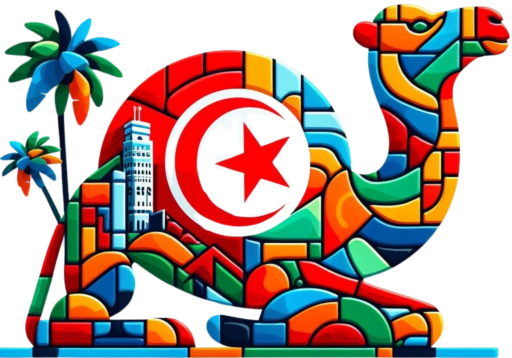WhatsApp has become one of the most widely used messaging applications worldwide, and Tunisia is no exception. With a young and increasingly connected population, the country has seen a significant rise in the use of this platform. WhatsApp offers a range of features that go beyond simple messaging, such as voice and video calls, file sharing, and group creation, making it a versatile tool for communication.
In Tunisia, where social interactions are fundamental, WhatsApp has found fertile ground to thrive. The popularity of WhatsApp in Tunisia is also linked to its ability to overcome linguistic and cultural barriers. With the ability to send messages in Arabic, French, and English, users can easily communicate with one another regardless of their background.
Furthermore, the application is free and only requires an internet connection, making it accessible to a wide audience. This has helped turn WhatsApp into an essential tool for everyday communication among friends, family, and colleagues.
Summary
- WhatsApp is widely used in Tunisia as the main means of communication
- Users in Tunisia can access WhatsApp via mobile internet or Wi-Fi connection
- WhatsApp limitations in Tunisia include censorship of certain content and the possibility of intercepted communications
- WhatsApp is extremely popular in Tunisia, with a high number of active users
- Users in Tunisia use WhatsApp to communicate with friends, family, and colleagues, as well as to share multimedia content and personal information
Access to WhatsApp in Tunisia
Access to WhatsApp in Tunisia is generally considered simple and straightforward. Users can download the application from major digital stores like Google Play and the Apple Store without any significant restrictions. However, internet access remains a crucial factor for using the app.
Tunisia has seen an improvement in network infrastructures in recent years, with an increase in 4G coverage and a growing prevalence of broadband. This has facilitated access to services such as WhatsApp, allowing an ever-increasing number of people to connect. Nevertheless, there are still rural and remote areas in Tunisia where internet access is limited or unstable.
In these areas, users may face difficulties connecting to WhatsApp or maintaining a stable connection during conversations. Additionally, the cost of mobile data can be a barrier for some, making regular use of the app challenging. However, in urban areas and populated centers, access is generally good and users can fully utilize the features offered by WhatsApp.
Limitations of WhatsApp in Tunisia

Despite its popularity, WhatsApp in Tunisia is not without limitations. One of the main concerns is the quality of service during significant events or public demonstrations. In the past, the Tunisian government temporarily blocked access to WhatsApp and other messaging platforms during periods of social tension or protests.
These measures were taken to prevent the spread of information deemed sensitive or potentially destabilizing. Additionally, there have been reports of technical issues affecting Tunisian users, such as delays in message delivery or difficulties with voice calls. These problems can be attributed to network congestion or malfunctions within the app itself.
Even though WhatsApp continues to work on improving its platform, government-imposed limitations and technical issues can negatively affect the user experience in Tunisia.
Popularity of WhatsApp in Tunisia
The popularity of this app is constantly growing, thanks to its ability to adapt to the needs of local users. According to recent statistics, a significant percentage of the Tunisian population regularly uses the application to communicate. This phenomenon is particularly evident among young people, who see WhatsApp as an effective way to stay in touch with friends and family, as well as a useful tool for organizing social events and activities.
Furthermore, WhatsApp has also found application in the workplace. Many Tunisian companies use the app to communicate with employees and manage projects. The ability to create groups allows for rapid and efficient communication among team members, facilitating collaboration and the coordination of work activities.
This versatility has helped consolidate WhatsApp’s position as an indispensable tool in the daily lives of Tunisians.
Usage of WhatsApp in Tunisia
The use of WhatsApp in Tunisia extends far beyond simple messaging among friends. Users take advantage of the app’s features for a variety of purposes, including sharing news, information, and multimedia content. Group chats are particularly popular, as they enable users to stay updated on local events and relevant discussions.
Moreover, many Tunisians use WhatsApp to organize social gatherings or community events, demonstrating how the app has become an integral part of social life. Another interesting aspect of WhatsApp usage in Tunisia is its impact on local commerce. Increasingly, small businesses and vendors use the app to promote their products and services, interacting directly with customers through personalized messages.
This trend has led to the emergence of new business opportunities and has made it easier for consumers to access product information and make purchases directly through the application.
Privacy Issues on WhatsApp in Tunisia

Protection of Personal Data
The issue of protecting personal data has become increasingly relevant in recent years, especially in light of growing global concerns about cybersecurity. Tunisian users are aware that information shared on WhatsApp could be vulnerable to privacy breaches or unauthorized access.
Government Surveillance
Additionally, there have been documented cases of government surveillance on messaging platforms like WhatsApp. Users fear that their conversations may be monitored or recorded without their consent. This situation has led some Tunisians to be more cautious in using the app to discuss sensitive or controversial topics.
Lack of Transparency
The lack of transparency regarding WhatsApp’s privacy policies has further fueled these concerns.
Government Regulations on WhatsApp in Tunisia
The Tunisian government has adopted a series of regulations regarding the use of messaging platforms like WhatsApp. These regulations aim to ensure national security and prevent the spread of content considered harmful or destabilizing. However, such measures have raised questions about freedom of expression and users’ ability to communicate freely.
In some cases, the government has imposed temporary restrictions on access to WhatsApp during public events or political demonstrations. These actions have raised concerns among activists and human rights advocates, who view such measures as an attack on freedom of expression. The tension between ensuring public safety and respecting individual rights remains a central issue in the debate over the use of this application.
Future of WhatsApp in Tunisia
The future of WhatsApp in Tunisia appears promising but not without challenges. With increasing internet penetration and continued development of mobile technologies, it is likely that more Tunisians will join the platform in the coming years. However, issues related to privacy and government surveillance could affect the way users interact with the application.
Furthermore, competition from other messaging platforms could pose a challenge for WhatsApp. Applications like Telegram and Signal are gaining popularity due to their advanced security and privacy features. If WhatsApp fails to adequately address these concerns, it might lose part of its user base in favor of more secure alternatives.
The application’s ability to adapt to local needs and social dynamics will be crucial to its future success in Tunisia.
Knowing that WhatsApp works in Tunisia is very important for travelers who wish to stay in touch with friends and family during their visit. For more information on what to do before departing for a trip to Tunisia, we recommend contacting your mobile operator.
Read more of our articles.
FAQs
Does WhatsApp work in Tunisia?
Yes, WhatsApp works in Tunisia. Tunisian users can use the app to send messages, make voice and video calls, share files, and more.
Is it legal to use WhatsApp in Tunisia?
Yes, using WhatsApp is legal in Tunisia. The app is widely used throughout the country to communicate with friends, family, and colleagues.
What are the restrictions on using WhatsApp in Tunisia?
At present, there are no specific restrictions on the use of this app. However, it is important to remember to adhere to local laws and regulations when using the app.
Can I use WhatsApp for international calls from Tunisia?
Yes, it is possible to use WhatsApp for international calls from Tunisia. However, roaming charges or additional costs may apply from your mobile operator. It is advisable to check with your provider before making international calls via WhatsApp.





